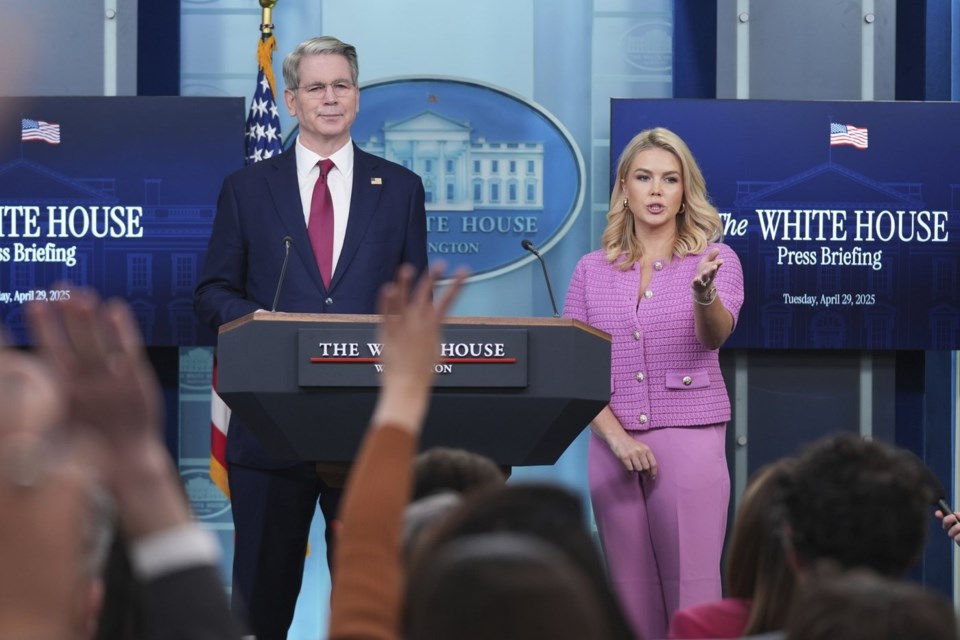WASHINGTON — U.S. President Donald Trump was set to sign an executive order Tuesday to provide some relief to an automotive industry besieged by multiple tariffs.
"We just wanted to help them endure this little transition, short term … If they can’t get parts, you know it has to do with a very small percentage, if they can't get parts we didn't want to penalize them," Trump told reporters at the White House.
The order has not yet been released publicly. A senior Commerce Department official who previewed the changes on a call with reporters said the administration will offer automakers that finish their vehicles in the U.S. a 15 per cent rebate this year to offset the cost of the tariffs. The rebate would drop to 10 per cent the second year.
The official said the measure will give automakers time to reshore production of parts and it will be available to domestic and foreign companies with auto plants in the U.S.
"We are just giving them a little chance because in some cases they can't get the parts fast enough," Trump said. "So this is just a little transition."
Trump slapped a 25 per cent tariff on vehicle imports to the United States earlier this month. Automakers are also being hit with 25 per cent duties on aluminum and steel, as well as the president's 10 per cent universal tariffs and 145 per cent levies on Chinese imports.
The Wall Street Journal first reported the change Monday and said companies paying the automobile tariffs won't see other levies — including the ones on steel and aluminum — stacked on top of each other. It is not clear if that will be included in the executive order.
Treasury Secretary Scott Bessent told a White House briefing earlier Tuesday that Trump is committed to bringing automobile manufacturing back to the United States.
"We want to give the automakers a path to that quickly, efficiently, and create as many jobs as possible," Bessent said.
It's not immediately clear what the full impact of the change will be for Canada's auto industry, which received a partial carve-out from Trump's tariffs for vehicles compliant with the Canada-U.S.-Mexico Agreement on trade, called CUSMA. The current duties only hit the value of the non-American parts of vehicles finished in Canada.
Candace Laing, president and CEO of the Canadian Chamber of Commerce, said the ongoing inconsistency of Trump's tariffs is driving away investment and business in Canada and the U.S. Only an end to tariffs will provide real relief, she said.
"North American autoworkers, plants and investors can't predict how the U.S. administration will wake up and feel on any given morning," Laing said in a statement. "Business plans are delayed. Pricing pressure is rising."
Bessent said Trump had meetings with domestic and foreign auto producers before making the changes.
General Motors chair and CEO Mary Barra said the company appreciates "the productive conversations" with the president and his administration and looks forward "to continuing to work together."
"We believe the president's leadership is helping level the playing field for companies like GM and allowing us to invest even more in the U.S. economy," Barra said in an emailed statement.
Six of the auto industry's largest lobbying groups sent a letter to the Trump administration last week urging tariff relief and warning of supply chain disruption and higher prices. The letter said "most auto suppliers are not capitalized for an abrupt tariff induced disruption."
"Many are already in distress and will face production stoppages, layoffs and bankruptcy," said the letter, which was signed by the Alliance for Automotive Innovation, which represents every major automaker in the United States except Tesla Inc.
The announcement came as Trump was headed Tuesday to Michigan, the heart of America's automobile industry, for a rally to mark his administration's first 100 days.
The state is home to the Detroit Three — Ford, General Motors and Chrysler, now part of Stellantis — all of which have been pushing the president against tariffs that are upending the deeply integrated North American automobile industry.
Stellantis chairman John Elkann said the company appreciates the tariff relief.
"While we further assess the impact of the tariff policies on our North American operations, we look forward to our continued collaboration with the U.S. administration to strengthen a competitive American auto industry and stimulate exports," Elkann said in an emailed statement.
Trump has claimed Canada is taking American automobile jobs but the two countries have been developing the industry in tandem since the early 1900s. Integration was deepened with the 1965 Auto Pact trade deal between Canada and the U.S.
CUSMA, negotiated during the first Trump administration, increased protections for the automobile industry. Vehicles can cross the border multiple times before completion and Trump's tariffs have led to confusion and concern on both sides of the Canada-U.S. border.
"Whether the U.S. administration likes it or not, we're in this together and supply chains don’t heal quickly once broken," Laing said.
Anderson Economic Group, a Michigan consulting firm, estimated earlier this month that an extra US$5,000 could be added to the cost of the lowest-tariffed American cars, and up to US$12,000 to the price of full-sized SUVs. Trump's tariffs have since changed rapidly.
— With files from The Associated Press
This report by The Canadian Press was first published April 29, 2025.
Kelly Geraldine Malone, The Canadian Press




